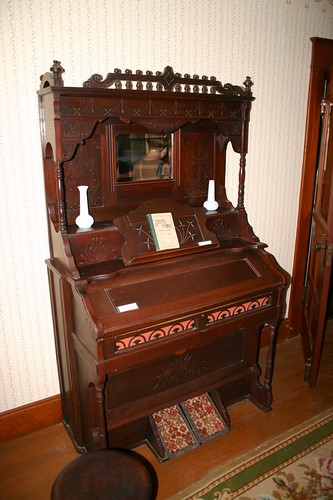Two years ago, I wrote about Elvera Voth and the power of love. Back then I wrote about her memories of seeing of service workers, who would be away from their home for 7 years at a time. Elvera remembered a gathering of people at the train station to see them off, and how they sang some German hymns at the occasion.
Elvera’s done a lot since, including starting an arts in prison program. And today, she hosted a hymn sing at the pump organ in the Friesen House parlor.
The Friesen House is nearly 100 years old, and was on my parents’ property before it got moved to the Mennonite Heritage and Agricultural Museum.
We were among maybe 20 people that showed up for the event. We walked in a few minutes early and Elvera was sitting at the organ already, along with a few other early arrivals. Many of the people there were over 70, and the moment we walked in, she said, “Oh good! Another generation!” And, of course, asked about us, where we live, who we are related to, etc.
The announcement in our church bulletin said to bring a copy of Gesangbuch mit Noten if you have one. That was a common hymn book in Mennonite churches in Kansas (songbook with notes — and yes, there was one without notes that had only words.) I pulled out my copy, and just opened it up. I saw my grandma’s beautiful handwriting saying it belonged to “Mr. and Mrs. R. A. Klassen”. This I brought along, but was perhaps the only one. Elvera recognized it and was pleased to hear where it came from.
We had a great time, and it turned out to feel like the kind of afternoon people around here used to have: time with friends and family visiting and maybe singing on occasion.
After some introduction and some stories, we got to the singing… and started with hymn #1 in the 1969 (English) Mennonite Hymnal. That song had German words below as well, which we sang: Grosser Gott, wir loben dich! (Holy God, We Praise Thy Name) Elvera played the organ while we all sang.
And then we turned to #556, O Have You Not Heard. We read through the German lyrics (to help those that don’t speak German):
Ich weiss einen Strom, dessen herrliche Flut
fliesst wunderbar stille durchs Land,
doch strahlet und glänzt er wie feurige Glut,
wem ist dieses Wässer bekannt?O Seele, ich bitte dich: Komm!
Und such diesen herrlichen Strom!
Sein Wasser fliesst frei und mächtiglich,
o glaub’s, es fliesset für dich!
Elvera translated this herself, a much more powerful translation than we usually get in English. And then we sang, this time a cappella.
Elvera told the story about the train station to this group, and then, of course, we sang O Power of Love, one of the songs sung on that occasion. For that, she asked us to stand up and form a circle around the organ, and again we sang mostly a cappella. Singing that song with Elvera left few dry eyes in the room for sure.
Someone brought up Nun Ist Sie Erschienen, and so of course we sang that. It wasn’t in any hymnal, but I suspect we were the only ones there that didn’t have it completely memorized.
Elvera told us the story of the museum’s pump organ; it had been in her family, and she had paid to have it restored and eventually donated it to the museum. It had been used every evening at twilight for singing and devotions in the family.
She also told us that the singing at the Newton train station — the same one our family uses a few times a year — was what inspired her to a career of choral music.
In the end, we probably spent more time visiting than singing, but that was just fine.
Next the group went over to the Preparatory School, an old schoolhouse also on the museum grounds. There we had a traditional Faspa, an afternoon meal with coffee, Zwieback and jam, cheese, and various cookies. We all visited for awhile longer and then went on our way.
It was a wonderful afternoon, and I hope to have a chance to do that sort of thing again.

Wound up on your blog after searching another ham’s Twitter account. I enjoyed this blog posting about Elvera Voth and the pump organ. So many good stories to hear from older generations. One of my uncles donated a hand made immigrant trunk to the Kauffman Museum in Newton, KS that traveled with my relatives from Russia. WIsh I knew more stories about that went with it.
Interested to hear your further exploits into ham radio. I’ve been ham for 30+ years but having trouble finding time to spend with it.
Phil Harder, K4NE
Harrisonburg, VA
Hi Phil,
Nice to hear from you — and very interesting that one of those trunks has a connection with you. If you haven’t visited recently, the Mennonite Heritage and Agricultural Museum in Goessel, KS has an exhibit about the trunks and the trips they made across the continents.
Will have to put the museum in Goessel on my ‘to-do’ list next time I’m in KS. Have a sister in N. Newton I should visit anyway.